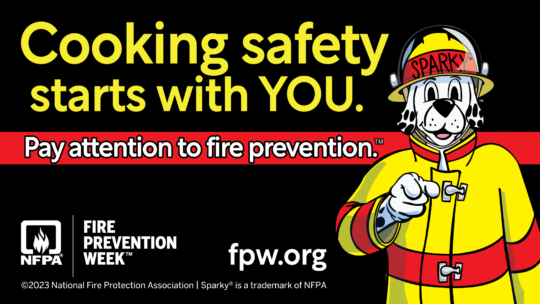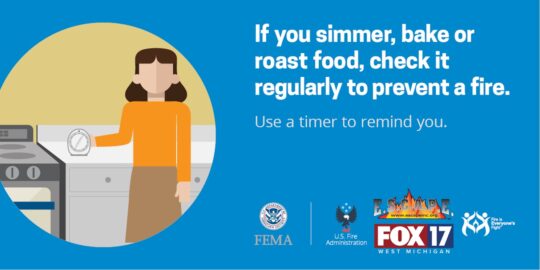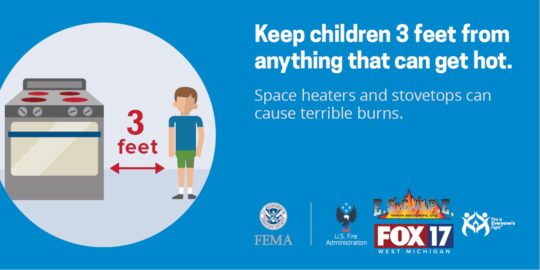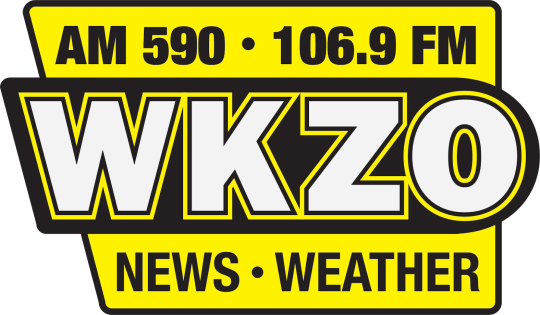Thanksgiving is all about the food, and the kitchen can be a chaotic place as families get all the goods ready for the feast. This also makes Thanksgiving the most common time for cooking fires; when there are more than double the average of any other day.
To avoid disaster this holiday season, E.S.C.A.P.E. Fire Safety offers a few simple tips so families can enjoy time with loved ones and keep themselves safer from fire.
If you are roasting your turkey, make sure you set a timer. This way, you won’t forget about the bird as you watch the parade or football game.
Deep frying a turkey may be delicious but it also can be dangerous. If frying a turkey:
- Use a fryer with thermostat controls. This will ensure the oil does not become overheated.
- Thaw your turkey completely. Ice on the bird will cause the oil to splatter.
- Don’t overfill the pot with oil. The oil will overflow when adding the turkey causing a fire hazard.
- Keep children and pets at least 3 feet away from the fryer to protect against burn injuries.
- Also, always use the fryer outdoors on a sturdy, level surface away from things that can burn.
Stuffing and Potatoes:
- Stand by the stove when boiling potatoes or frying onions for the stuffing. It’s best to stay in the kitchen when frying, boiling, or broiling. It’s easier to catch spills or hazardous conditions before they become a fire.
Vegetables:
- Keep the area around the stove clear of food packaging, paper towels, and dishcloths; anything that can burn.
- Be sure to clean up any spills as they happen.
- Be prepared! Keep a large pan lid or baking sheet handy in case you need to smother a pan fire.
- Turn pot handles towards the back of the stove so you don’t bump them.
By following these safety tips, families can have a safe, fire-free Thanksgiving!
Thanksgiving Day is a time to spend with family and friends. It’s also the peak day of the year for home fires. Michael McLeieer, president and founder of E.S.C.A.P.E. Inc. spoke with Ken Lanphear on the WKZO Morning Show on Tuesday 11/21/2023 at 7:50 a.m. and shared several tips to prevent a home fire.
The kitchen is an important place as we move through the week of Thanksgiving. It makes keeping fire safety in mind important, especially when there is a lot of activity and a lot of people in the home.
The United States Fire Administration says Thanksgiving is the peak day for home cooking fires and frying food increases the risk. The average number of reported home fires in the United States on Thanksgiving Day is more than double the average number of home fires on all other days. According to the National Fire Protection Association, Thanksgiving Day fires in residential buildings occurred most frequently from noon to 3 p.m., when many people most likely were preparing Thanksgiving dinner.
Michael McLeieer with E.S.C.A.P.E. Fire Safety joined FOX 17 to share some simple tips to keep everyone safe.
Turkey:
- If you are roasting a turkey, make sure you set a timer so you don’t forget about it as you watch the parade or football game
Deep frying a turkey:
- Use a fryer with thermostat controls to make sure the oil does not become overheated
- Thaw your turkey completely. Ice on the bird will cause oil to splatter
- Don’t overfill the pot with oil
- Keep children and pets at least three-feet away from the fryer to protect against burn injuries
- Always use the fryer outdoors on a sturdy, level surface away from anything that can burn
Stuffing and Potatoes:
- Stand by your stove while boiling tomatoes or frying onions. it makes it easier to catch spills or hazardous conditions before they become a fire.
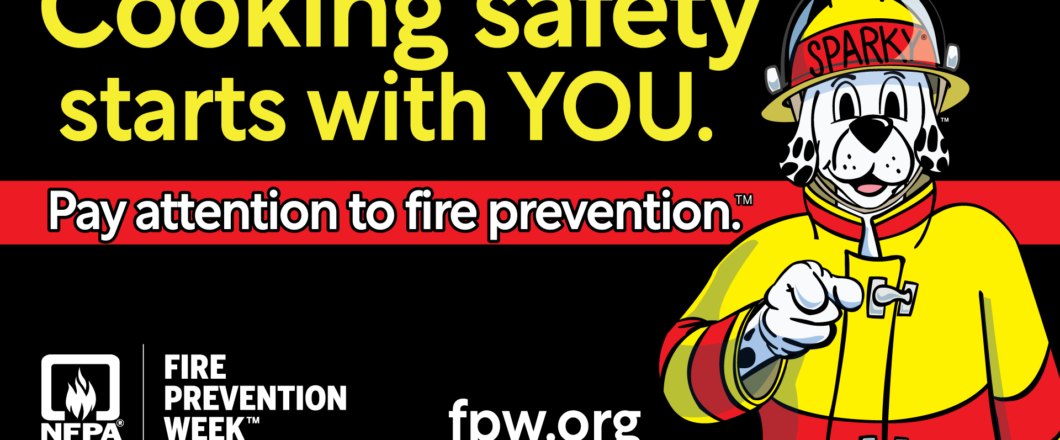
October 8 – 14, 2023 marks Fire Prevention Week!
It’s no secret that food brings people together. Spending time in the kitchen can be a fun way to bring family and friends together, whether you’re making a favorite family recipe, baking up a delicious dessert or experimenting with a new ingredient. But the fun can quickly turn to chaos if a fire occurs in the kitchen.
The United States Fire Administration (USFA) says cooking is the leading cause of home fires and fire injuries.
That’s why this year’s Fire Prevention Week theme is “Cooking safety starts with YOU. Pay attention to fire prevention.” This year, October 8-14 is recognized as Fire Prevention Week.
According to the National Fire Protection Association, fire departments in the United States respond to an estimated average of 172,000 home cooking fires each year. Those fires cause an estimated 550 deaths, 4,820 injuries and more than $1 billion in property damage a year.
“To prevent cooking fires, you must stay alert,” says firefighter Michael McLeieer, president of the nonprofit E.S.C.A.P.E. Fire Safety. “You will not be alert if you are sleepy, have consumed alcohol, or have taken medicine or drugs that make you drowsy.”
As you start preparing your next meal and organizing that large family feast, remember to play it safe! E.S.C.A.P.E. Fire Safety, First Alert, the NFPA and USFA have some steps you can take to keep your kitchen and kids safe and prevent fires.
Remain in the Kitchen When Cooking
- An adult should remain in the kitchen when anyone is frying, boiling, grilling, or broiling food.
- Stay at home when simmering, baking or roasting food and check it regularly.
- Watch what you heat – Use a timer when cooking to help ensure you don’t lose track of the time. This is an especially important kitchen fire safety tip for beginner cooks.
- Turn pot handles toward the back of the stove so that no one can bump the pot or pull it over.
- Keep a pan lid or baking sheet nearby while cooking. Use it to cover the pan if it catches on fire as this will put the fire out.
Keep the Kitchen Free from Clutter
- Remove items that do not belong in the kitchen and avoid any additional fire hazards.
- Be mindful of kitchen materials that are flammable and can easily start fires such as oven mitts, wooden utensils, towels, curtains or even excess food packaging and keep them away from the stovetop or other cooking surfaces.
- Give everything a specific place in the kitchen to help reduce the risk of it being left out and catching fire, ensuring the kitchen remains a safe place.
Unplug or Turn Off Appliances
- Unplug any countertop appliances when they are not in use, like toasters and coffee makers. This will help reduce the risk of a fire starting.
- Turn off the appliance you are using as soon as you are finished cooking your food.
- Clean off leftover dust, food crumbs and grease from your stovetop after use.
Install and Maintain Smoke Alarms
- Install smoke alarms in every sleeping room, outside each separate sleeping area and on every level of the home including in the basement.
- A closed door may slow the spread of smoke, heat and fire.
- Test smoke alarms at least once a month, replace 9-volt smoke alarm batteries at least once a year and replace alarms every 10 years.
- Larger homes may require additional smoke alarms to provide a minimum level of protection.
- Interconnect all smoke alarms throughout the home for the best protection so that when one alarm sounds, they all sound. When you hear a smoke alarm, you may have less than 2 minutes to get everyone outside and safe. Call 9-1-1 once outside and at the pre-designated meeting place (tree, neighbor’s house, etc.).
- Make sure everyone can hear the sound of the smoke alarm anywhere in the home.
- For people who are deaf or hard of hearing, install smoke alarms with alert devices (pillow or bed shaker or a flashing strobe light).
- Install smoke alarms away from the kitchen to prevent nuisance alarms. They should be installed at least 10 feet from a cooking appliance.
Create a Kid-Free Zone Around Your Stove While Cooking
- Have a “kid-free zone” of at least 3 feet around the stove and areas where hot food or drink is prepared or carried.
- Never hold a child while you are cooking, drinking a hot liquid, or carrying hot foods or liquids.
- Keep pets off cooking surfaces and nearby countertops to prevent them from knocking things onto a burner.
By following these safety tips, you will have a delicious and fire-safe meal!
Here are our television and radio broadcasts promoting Fire Prevention Week 2023
Maranda visits the Coopersville Polkton Fire Department in Ottawa County to learn from experts about the 2023 Fire Prevention Week theme which focuses on safe cooking. – 10-05-2023 11:45 a.m and 3:45 p.m.
WILX News 10 interviews the PIO for Michigan MABAS, Michael McLeieer near Lansing, MI about the 2023 Fire Prevention Week theme. – 10-08-2023 6pm
Fox 17‘s Max Goldwasser interviews E.S.C.A.P.E.’s president and founder firefighter Michael McLeieer about the 2023 Fire Prevention Week theme. – 10-09-2023 7:20 a.m.
WKZO AM 590 and FM 106.9 Morning Show Host Ken Lanphear interviews E.S.C.A.P.E. founder Michael McLeieer about Fire Prevention Week 2023 – 10-09-2023 8:15 a.m.
10-09-2023 – Max Goldwasser expands his fire safety interview during the 9 am hour after 2 children died in an overnight house fire in the City of Kalamazoo.
10-10-2023 10 a.m. – Michael McLeieer visits the Fox 17 Morning Mix to share fire prevention tips.
Read More







